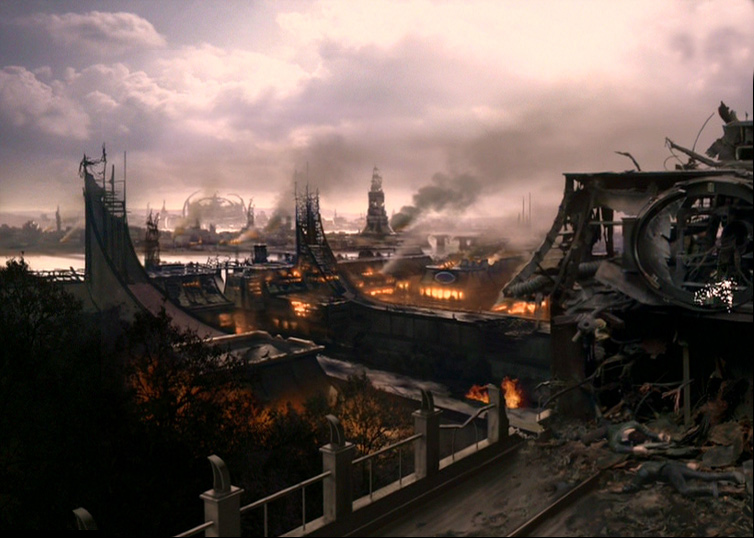 Because “53 reasons” is just plain stupid, and increments of five are basically listicles, I provide three.
Because “53 reasons” is just plain stupid, and increments of five are basically listicles, I provide three.
1. We are heading straight for maximum Star Wars saturation. Despite its ham-handed didacticism, Star Trek‘s values are far preferable to those of Star Wars. We cannot allow aristocratic fantasy to bury republican virtue.
2. JJ Abrams is a pretty good action director, but he doesn’t seem to understand the intellectual possibilities of science fiction. At its best, Star Trek has been one of the few non-cable programs to explore those possibilities. And it has almost invariably done so better within the format of episodic television than that of the “major motion picture.”
3. Onward toward the 25th Century! By the third season of The Next Generation, it was pretty clear that the political communities of Star Trek — including the United Federation of Planets and the Klingon Empire — are themselves important “characters” in the franchise. We’ve seen the Federation evolve –and not always for the best — in light of the Borg and Dominion threats; we’ve learned just how much its status as a “post-scarcity society” rests on maintaining a Terra-centric utopia within a much harsher galaxy. We’ve watched the Klingon Empire repeatedly fail to reconcile the theory and practice of honor. Cardassia has broken our hearts time and time again.
They key point here should be clear: there’s a lot of room left to explore the arcs of these well-developed fictional societies and of their interactions. Even more important: the world has changed markedly since the last time canonical material did so. Voyager took place at the margins of Alpha-quadrant politics. Enterprise chronicled the formation of the Federation. DS9 — the indisputable high-point of the franchise* — was conceived in the shadow of the first US-Iraq War. We need a Star Trek for the present era.
*And by “indisputable,” I mean “totally disputable by legions of Star Trek fans that obviously have no idea what they’re talking about.”
Daniel H. Nexon is a Professor at Georgetown University, with a joint appointment in the Department of Government and the School of Foreign Service. His academic work focuses on international-relations theory, power politics, empires and hegemony, and international order. He has also written on the relationship between popular culture and world politics.
He has held fellowships at Stanford University's Center for International Security and Cooperation and at the Ohio State University's Mershon Center for International Studies. During 2009-2010 he worked in the U.S. Department of Defense as a Council on Foreign Relations International Affairs Fellow. He was the lead editor of International Studies Quarterly from 2014-2018.
He is the author of The Struggle for Power in Early Modern Europe: Religious Conflict, Dynastic Empires, and International Change (Princeton University Press, 2009), which won the International Security Studies Section (ISSS) Best Book Award for 2010, and co-author of Exit from Hegemony: The Unraveling of the American Global Order (Oxford University Press, 2020). His articles have appeared in a lot of places. He is the founder of the The Duck of Minerva, and also blogs at Lawyers, Guns and Money.


Let’s see the Ferengi kill the Federation’s welfare state by inventing CDOs.
I watched DS9 because a friend of mine was into it, and I compared it unfavorably to Babylon 5 (which was on the same nights, so we watched them back to back), mockingly referring to it as “Deep Space 90210.” But in retrospect I think I was unfair to the show; you’re probably right about it being the high point of the Star Trek franchise, and that isn’t faint praise. Though it still wasn’t as good as Babylon 5. Maybe an entirely new space opera setting would be even better?
B5 is a wonderful case study in how terrific ideas and some great supporting actors can almost — but not really — overcome abysmal writing. At B5’s height I felt the same way. Watching DS9 while knowing where the series is headed is a revelation. Also seeing ST grapple with religion and with faith.
ach, firefly. What might have been. Sigh. Also caprica.
I think Londo and G’Kar are almost enough on their own to make B5 worthwhile.
Drone starships patrol the galaxy while crews stay at home.
DS 9, really? Did it get crazy good after I gave up? After the grand nagus, I began thinking that I was wasting gprecious bits of mortality that could better used watching “city on the edge of forever” for the 97th time.
Mock Wallace Shawn at your infinite peril.
Nobody crosses Wallace Shawn when death is on the line! Mad love. But mad love is one thing, hagiography another. Woody’s a genius; but not because of ‘interiors’.
Willing to be convinced on ds9. Fire up the Netflix! 2017 be damned…
Also, this: https://www.buzzfeed.com/donnad/this-is-what-a-pixar-star-trek-reboot-would-look-like
“The Enterprise crew was driving a misfiring IBM PC in the service of a quasi-neoliberal agenda, and at the same time, so were we.” – Brian Phillips, with the last word on TNG, here: https://www.grantland.com/story/_/id/8435126/next-generation-turns-25